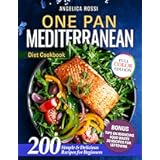The Mediterranean diet is often celebrated for its incredible impact on heart health. The video above explains why this traditional eating pattern offers such significant benefits. This ancient way of eating is not just a passing trend; it represents a comprehensive approach to wellness.
Studies consistently demonstrate its effectiveness. People who follow the Mediterranean diet often show lower rates of serious conditions. These include heart disease, stroke, and type 2 diabetes. It is more than just a list of foods; it is a lifestyle choice.
Understanding the Core Components of the Mediterranean Diet
The Mediterranean diet is truly diverse. Its specific elements can vary significantly by region. However, several core components remain constant. These foods form the foundation of this healthy eating style.
Fruits, Vegetables, and Whole Grains: The Foundation
Firstly, an abundance of fresh fruits and vegetables is crucial. These provide essential vitamins, minerals, and antioxidants. These compounds help protect your cells from damage.
Whole grain cereals are also central to this diet. Examples include wholemeal bread and brown rice. These grains offer sustained energy. They are also packed with dietary fiber.
Healthy Fats: Olive Oil, Nuts, and Seeds
Secondly, olive oil is a defining feature. It is used as the main source of fat. Olive oil is rich in monounsaturated fats. These fats are known to support heart health.
Unsalted nuts and seeds are also important. They provide healthy fats, protein, and fiber. These tiny powerhouses contribute to overall wellness. Almonds, walnuts, and sunflower seeds are excellent choices.
Lean Proteins: Fish, Beans, and Pulses
Thirdly, fish is a primary protein source. Both white fish and oily fish are included. Oily fish like sardines and salmon are especially beneficial. They contain omega-3 fatty acids.
Beans and pulses are also staples. Chickpeas and lentils are great examples. They are excellent sources of plant-based protein and fiber. These foods help maintain healthy blood sugar levels.
Small amounts of lean meat are sometimes consumed. Low-fat dairy products are also included in moderation. Fresh herbs, onions, and garlic flavor meals. They add taste without excess salt.
Alcohol in Moderation: Wine as an Option
Wine is sometimes associated with this diet. However, it is an optional component. Alcohol consumption should always be in moderation. The recommended limit is no more than 14 units per week. This ensures potential benefits are not outweighed by risks.
Beyond the Plate: Embracing the Mediterranean Lifestyle
The health benefits of the Mediterranean diet go beyond just food. Traditional lifestyle habits play a key role. These practices contribute significantly to overall well-being. They enhance the diet’s positive effects on the heart.
1. **Eating Slowly and Socially:** Meals are often savored. They are enjoyed with family and friends. This communal aspect reduces stress. It also promotes mindful eating habits.
2. **A Relaxed Way of Life:** A less hurried pace is often adopted. Stress management is very important. Chronic stress can negatively impact heart health. A relaxed mindset supports cardiovascular function.
3. **Regular Physical Activity:** Movement is integral to daily life. This can include walking, gardening, or other activities. Consistent exercise strengthens the heart. It also helps manage weight effectively.
These lifestyle factors are just as important as the food itself. They create a holistic approach to health. Studies confirm that communities living this way have a lower risk of heart and circulatory diseases. The combination is powerful for long-term health.
How the Mediterranean Diet Protects Your Heart
The health benefits of the Mediterranean diet are multifaceted. They do not come from a single food item. Instead, they result from the synergy of the entire eating pattern. Several key mechanisms contribute to its heart-protective qualities.
Lowering Cholesterol with Unsaturated Fats
1. **Unsaturated Fat Intake:** The diet is rich in unsaturated fats. Olive oil is a prime example of this. Nuts and oily fish also provide these healthy fats. They play a vital role in heart health.
2. **Cholesterol Reduction:** Switching from saturated to unsaturated fats is beneficial. This dietary change helps lower harmful LDL cholesterol levels. High cholesterol is a major risk factor for heart attack and stroke. A reduction in LDL cholesterol lessens this risk over time.
Research indicates that replacing saturated fats with unsaturated fats can significantly improve lipid profiles. This means healthier arteries and better blood flow. These changes directly support a stronger heart.
Managing Blood Pressure Through Reduced Salt
1. **Focus on Fresh Foods:** The Mediterranean diet emphasizes fresh, unprocessed foods. This naturally leads to lower salt intake. Processed foods often contain hidden high levels of sodium. Avoiding these reduces overall salt consumption.
2. **Blood Pressure Control:** Eating too much salt can cause high blood pressure. High blood pressure strains your heart and blood vessels. Reducing salt intake helps keep blood pressure at a healthy level. This lessens the burden on your cardiovascular system.
Studies consistently show a strong link. Lower sodium intake leads to healthier blood pressure readings. This is a simple yet effective way to protect your heart. The diet naturally supports this healthy practice.
The Power of Fiber for Heart Health
1. **Rich in Dietary Fiber:** The diet is packed with fiber-rich foods. These include fruits, vegetables, beans, and whole grains. Fiber is essential for digestive health. It also plays a significant role in heart protection.
2. **Soluble Fiber Benefits:** Soluble fiber is particularly helpful. It is found in pulses, beans, fruits, and vegetables. This type of fiber helps to lower cholesterol levels. It binds to cholesterol in the digestive tract, preventing its absorption.
Research associates a diet rich in fiber with lower rates of heart disease. Fiber also helps regulate blood sugar. Stable blood sugar levels are important for long-term cardiovascular health. These combined effects greatly benefit the heart.
Maintaining a Healthy Weight
1. **Promoting Satiety:** The Mediterranean diet is very satisfying. Its fiber and healthy fats keep you feeling full. This helps prevent overeating and unnecessary snacking. Managing portion sizes becomes easier.
2. **Weight Management:** Studies confirm that following this diet aids in weight maintenance. A healthy weight reduces strain on the heart. It also lowers the risk of obesity-related heart problems. This includes conditions like metabolic syndrome.
Maintaining a healthy weight is vital for heart health. It reduces inflammation throughout the body. The Mediterranean diet naturally supports achieving and keeping a healthy body mass. This comprehensive approach safeguards your cardiovascular system effectively.











